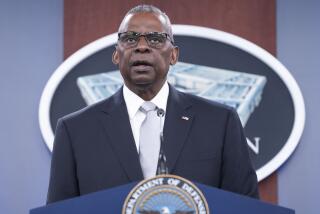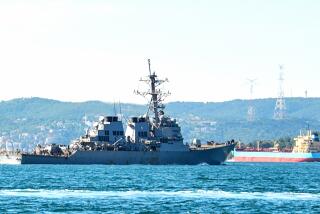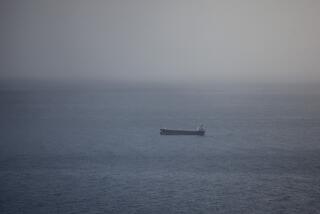Terrorism: Another Hard Lesson
- Share via
The terrorist attack on the U.S. destroyer Cole as it refueled in Yemen last Oct. 12 was a deadly instance of what the military calls asymmetrical warfare, the ability of an inferior power to inflict great damage on a far stronger one. The Cole, a $1-billion ship, was put out of action and 17 of its crew were killed by a team of suicide bombers in a small boat loaded with a few thousand dollars worth of explosives. While the timing of the attack couldn’t be predicted, the threat behind it has increasingly concerned U.S. officials. About 60 measures had been specified to protect the Cole while in harbor. Not all of these were carried out, but the Navy’s senior leaders have concluded that even if all security measures had been in place, the attack would not have been prevented.
That finding means the Cole’s captain and crew will not be punished, but it also highlights ominous gaps in procedures for protecting U.S. personnel and facilities from terrorist assaults. A new Pentagon study has found security shortcomings elsewhere in the Persian Gulf region where American forces are stationed or visit. The unclassified summary of its 138-page report recommends intensified anti-terrorism training for U.S. forces, improved intelligence gathering and insistence on tight protection from host countries for U.S. forces.
A central point made by the study is the need to focus on detecting and deterring terrorist threats before they can be carried out, instead of reacting to them after the fact. “We must get out of the purely defensive mode,” the study says. That this is more easily prescribed than accomplished is obvious.
Timely and effective intelligence is notoriously difficult to obtain where terrorist operations are mounted by all-but-impenetrable small groups motivated by ideology or religious belief. Against such an enemy, reconnaissance satellites and high-tech U.S. weapons count for little. There will be more asymmetrical warfare, not least because its success--as in the attack on the Cole and the 1998 bombings of two U.S. embassies in Africa--encourages repetition. Can anti-terrorism intelligence gathering be improved? With more money and effort, undoubtedly. That should be a priority, because no more immediate threat faces the country.
More to Read
Sign up for Essential California
The most important California stories and recommendations in your inbox every morning.
You may occasionally receive promotional content from the Los Angeles Times.













